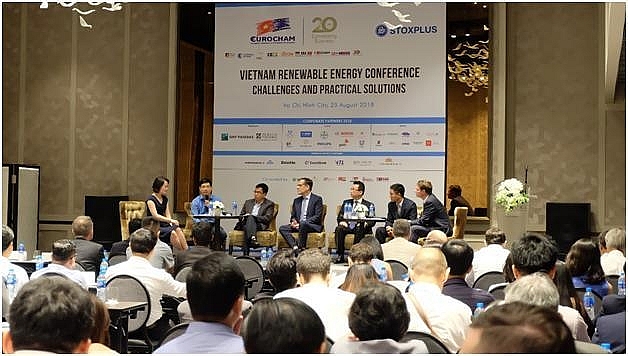StoxPlus: Six key takeaways from Vietnam renewable energy conference
 |
| The panel discussion at StoxPlus and Eurocham's conference on renewable energy |
The conference themed "Challenges and Practical Solutions" in Ho Chi Minh City, lured more than 130 participants from various backgrounds, including energy companies, banks, investment funds, insurance, as well as consulting and law firms.
The platform provided a forum to share insights on the current market landscape and project implementation, with contributions from the policy maker represented by the Electricity and Renewable Energy Authority (EREA) of the Ministry of Industry and Trade, and international and domestic market players, including institutional investor International Finance Corporation (of the World Bank Group), premier law firm VILAF, and experienced developer of renewable energy projects Bamboo Capital (BCG).
Below are the key takeaways from the presentations and the panel discussion.
First was to update on the progress of renewable energy (RE) projects, FiT changes, and PPA development. Accordingly, EREA’s representative Nguyen Ninh Hai gave a brief update on the status and progress of renewable energy.
By June 10, 2018, 100 solar projects have been added to the Provincial and National Power Master Plans. The MoIT has proposed the PM to raise FiT for on-shore wind power projects from 7.8 to 8.5 US cents per kWh, while FiT for solar projects may also see some downward changes after June 30, 2019.
Furthermore, the MoIT has been working on developing an auction mechanism for RE projects to be implemented in the future. Additionally, the MoIT has been working with the USAID to develop a direct power purchase mechanism via direct power purchase agreements (DPPA).
The second was key risks and issues for local developers. Notably, Dong Le of StoxPlus pointed out that many projects are stuck at the pre-investment and pre-construction stages. The slow progress is due to multiple risks that local developers face, including unbankable PPA terms, fixed FiT, and financing, operational, as well as counter-party risks.
However, these issues can be mitigated. A number of local developers with RE licenses and good working relations with local authorities still managed to find financing and technical support through local and foreign banks or foreign developers in structured deals of increasing foreign ownership.
The third was the importance of international financing. While supporting the announced changes to the FiT, Oliver Behrend of IFC stressed the importance of introducing a bankable PPA to enable Vietnam to attract the large amount of (international) financing necessary for the country to meet its medium- to long-term renewable energy targets, which are unlikely to be met with local finance alone, and to help reduce the cost of renewable energy for Vietnam when such cheaper, international financing is combined with a competitive procurement process for solar projects.
While in the short term, the Vietnamese market still depends on international financing sources, in the long term, local banks could build up experience via participation in syndications and would no longer need international partners.
The fourth was developing a bankable PPA. According to Oliver Behrend, there are three essential elements that need to be improved in the current PPA, including sufficient payments from EVN upon termination of the PPA to ensure project lenders are made whole, adequate compensation to the project if it is curtailed by EVN, and arbitration of disputes under the PPA in a neutral international jurisdiction. All three are already in place for Vietnam’s BOT projects.
The fifth were key factors in successful RE deals. As an experienced lawyer with a portfolio of many energy and infrastructure project, Duong Anh from VILAF stressed the key factors in structuring a successful energy development deal.
In green field investments, foreign investors usually have clear insights of the policy through their legal consultants and are willing to take the risks, being giant corporations with good political cushion from their respective countries.
Meanwhile, in brown field investments, it is very important to choose the right business partner and consultants to provide legal and technical support, to overcome challenges including obtaining financial support, land clearance, and PPA negotiation with EVN.
Given the tight timeline to achieve commercial operation date (COD) by June 2019, in order to enjoy the FiT of 9.35 US cent per kWh, it is even more exigent for all parties to be involved in the transaction.
The sixth was dealing with RE partnerships. Bamboo Capital Group, with investments in solar energy in Long An, shared their experience in dealing with domestic and foreign partners. While each side has its own risks, with the domestic partners lacking technical expertise or the foreign partners requiring high standards of operations, the most important factors are transparency and the willingness to communicate, where each party are willing to work towards a win-win end goal.
What the stars mean:
★ Poor ★ ★ Promising ★★★ Good ★★★★ Very good ★★★★★ Exceptional
Related Contents
Latest News
More News
- Bac Ai Pumped Storage Hydropower Plant to enter peak construction phase (January 27, 2026 | 08:00)
- ASEAN could scale up sustainable aviation fuel by 2050 (January 24, 2026 | 10:19)
- 64,000 hectares of sea allocated for offshore wind surveys (January 22, 2026 | 20:23)
- EVN secures financing for Quang Trach II LNG power plant (January 17, 2026 | 15:55)
- PC1 teams up with DENZAI on regional wind projects (January 16, 2026 | 21:18)
- Innovation and ESG practices drive green transition in the digital era (January 16, 2026 | 16:51)
- Bac Ai hydropower works stay on track despite holiday period (January 16, 2026 | 16:19)
- Fugro extends MoU with PTSC G&S to support offshore wind growth (January 14, 2026 | 15:59)
- Pacifico Energy starts commercial operations at Sunpro Wind Farm in Mekong Delta (January 12, 2026 | 14:01)
- Honda launches electric two-wheeler, expands charging infrastructure (January 12, 2026 | 14:00)

 Tag:
Tag:


























 Mobile Version
Mobile Version